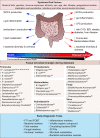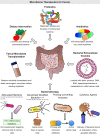Recent advancements in the exploitation of the gut microbiome in the diagnosis and treatment of colorectal cancer
- PMID: 34236075
- PMCID: PMC8314433
- DOI: 10.1042/BSR20204113
Recent advancements in the exploitation of the gut microbiome in the diagnosis and treatment of colorectal cancer
Abstract
Over the last few decades it has been established that the complex interaction between the host and the multitude of organisms that compose the intestinal microbiota plays an important role in human metabolic health and disease. Whilst there is no defined consensus on the composition of a healthy microbiome due to confounding factors such as ethnicity, geographical locations, age and sex, there are undoubtably populations of microbes that are consistently dysregulated in gut diseases including colorectal cancer (CRC). In this review, we discuss the most recent advances in the application of the gut microbiota, not just bacteria, and derived microbial compounds in the diagnosis of CRC and the potential to exploit microbes as novel agents in the management and treatment of CRC. We highlight examples of the microbiota, and their derivatives, that have the potential to become standalone diagnostic tools or be used in combination with current screening techniques to improve sensitivity and specificity for earlier CRC diagnoses and provide a perspective on their potential as biotherapeutics with translatability to clinical trials.
Keywords: bacterio-thearpy; colorectal cancer; diagnostic biomarkers; intestine; microbiome.
© 2021 The Author(s).
Conflict of interest statement
The authors declare that there are no competing interests associated with the manuscript.
Figures


Similar articles
-
Is treating the gut microbiome the key to achieving better outcomes in cirrhosis?Expert Rev Gastroenterol Hepatol. 2019 Jan;13(1):1-2. doi: 10.1080/17474124.2019.1543587. Epub 2018 Nov 13. Expert Rev Gastroenterol Hepatol. 2019. PMID: 30791837 No abstract available.
-
Role of Gut Microbiota in the Development and Treatment of Colorectal Cancer.Digestion. 2019;100(1):72-78. doi: 10.1159/000494052. Epub 2018 Oct 17. Digestion. 2019. PMID: 30332668 Review.
-
Gut Microbiota Manipulation as a Tool for Colorectal Cancer Management: Recent Advances in Its Use for Therapeutic Purposes.Int J Mol Sci. 2020 Jul 29;21(15):5389. doi: 10.3390/ijms21155389. Int J Mol Sci. 2020. PMID: 32751239 Free PMC article. Review.
-
Microbial Interactions and Interventions in Colorectal Cancer.Microbiol Spectr. 2017 Jun;5(3):10.1128/microbiolspec.bad-0004-2016. doi: 10.1128/microbiolspec.BAD-0004-2016. Microbiol Spectr. 2017. PMID: 28643625 Free PMC article. Review.
-
Intervention on gut microbiota may change the strategy for management of colorectal cancer.J Gastroenterol Hepatol. 2021 Jun;36(6):1508-1517. doi: 10.1111/jgh.15369. Epub 2021 Jan 5. J Gastroenterol Hepatol. 2021. PMID: 33295040 Review.
Cited by
-
Gut Microbiota and Colorectal Cancer: An Umbrella Review of Methodological Trends and Clinical Correlations.Cureus. 2024 Feb 14;16(2):e54210. doi: 10.7759/cureus.54210. eCollection 2024 Feb. Cureus. 2024. PMID: 38496101 Free PMC article. Review.
-
Bacteriophages, Antibiotics and Probiotics: Exploring the Microbial Battlefield of Colorectal Cancer.Int J Mol Sci. 2025 Aug 13;26(16):7837. doi: 10.3390/ijms26167837. Int J Mol Sci. 2025. PMID: 40869155 Free PMC article. Review.
-
Impact of gut microbiota and associated mechanisms on postprandial glucose levels in patients with diabetes.J Transl Int Med. 2023 Dec 20;11(4):363-371. doi: 10.2478/jtim-2023-0116. eCollection 2023 Dec. J Transl Int Med. 2023. PMID: 38130636 Free PMC article.
-
Microbiome and colorectal carcinogenesis: Linked mechanisms and racial differences.World J Gastrointest Oncol. 2022 Feb 15;14(2):375-395. doi: 10.4251/wjgo.v14.i2.375. World J Gastrointest Oncol. 2022. PMID: 35317317 Free PMC article. Review.
-
Inhibition of the Occurrence and Development of Inflammation-Related Colorectal Cancer by Fucoidan Extracted from Sargassum fusiforme.J Agric Food Chem. 2022 Aug 3;70(30):9463-9476. doi: 10.1021/acs.jafc.2c02357. Epub 2022 Jul 20. J Agric Food Chem. 2022. PMID: 35858119 Free PMC article.
References
Publication types
MeSH terms
Substances
Grants and funding
LinkOut - more resources
Full Text Sources
Medical

